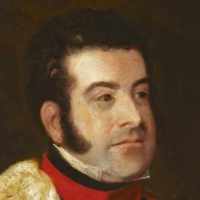George Augustus FitzClarence 1st Earl of Munster
16 January 1794–20 March 1842 (Age 48)
Teddington, London, England, United Kingdom
The Life Summary of George Augustus
When George Augustus FitzClarence 1st Earl of Munster was born on 16 January 1794, in Teddington, London, England, United Kingdom, his father, King William IV of the United Kingdom and Hannover, was 28 and his mother, Dorothea Bland, was 32. He married Mary Fox Wyndham Countess of Munster on 18 October 1819, in St George Hanover Square, London, England, United Kingdom. They were the parents of at least 4 sons and 3 daughters. He died on 20 March 1842, in London, England, United Kingdom, at the age of 48, and was buried in Windsor Castle, Berkshire, England, United Kingdom.
Photos and Memories (6)
Do you know George Augustus? Do you have a story about him that you would like to share? Sign In or Create a FREE Account
Family Time Line
Spouse and Children
1794–1842Male
1792–1842Female
Children
(7)
1820–1883Female
1822–1846Female
1824–1901Male
1826–1878Male
1834–1834Female
+2 More Children
Parents and Siblings
1765–1837Male
1761–1816Female
Siblings
(10)
1794–1842Male
1795–1817Male
1796–1837Female
1798–1864Female
1799–1854Male
+5 More Children
World Events (7)
1801 · The Act of Union
Age 7
1801 · The Act of Union
Age 7
1808 · The British West Africa Squadron
Age 14
1808 · The British West Africa Squadron
Age 14
1815
Age 21
1815
Age 21
Name Meaning
Dictionary of First Names © Patrick Hanks and Flavia Hodges 1990, 2003, 2006.
Sources (10)
- Geroge Earl Of Munster Fitzclarance in entry for Dorothea Augusta Fitzclarance, "England Births and Christenings, 1538-1975"
- George Duke Of Saxe-Meiningen in entry for William IV Henry King Of England, "England Marriages, 1538–1973 "
- Earl Of Munster in entry for Baron De Bonde, "British Newspaper Archive, Family Notices"
Discover Even More
As a nonprofit, we offer free help to those looking to learn the details of their family story.













